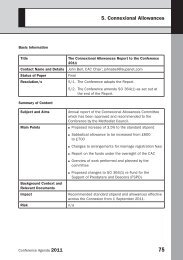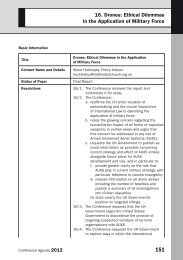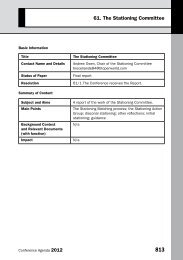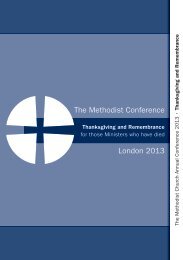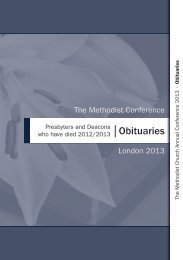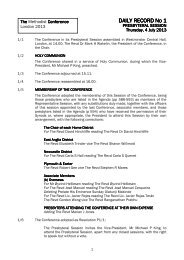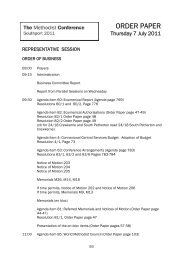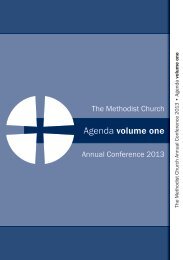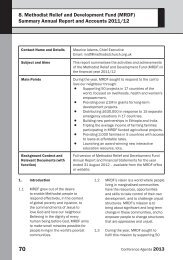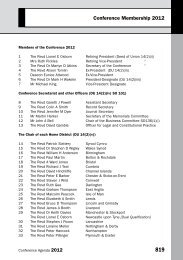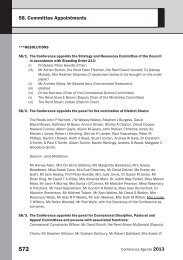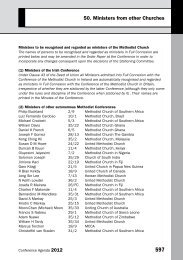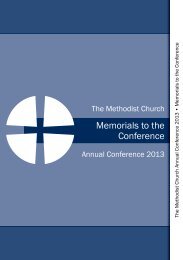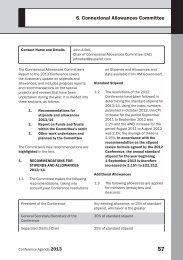Agenda Volume 3 - Methodist Conference
Agenda Volume 3 - Methodist Conference
Agenda Volume 3 - Methodist Conference
You also want an ePaper? Increase the reach of your titles
YUMPU automatically turns print PDFs into web optimized ePapers that Google loves.
57. The Fruitful Field Project<br />
base at which the <strong>Methodist</strong> family<br />
can gather and within which insights<br />
and challenges from across the world<br />
can be shared and nurtured.<br />
Making the most of our people<br />
98 The resources of skilled and<br />
knowledgeable staff in institutions<br />
and in regional and District teams<br />
have been a catalyst for many<br />
developments within the life of the<br />
Church in recent years. The role of<br />
tutors in developing supervision<br />
courses for Superintendents, the<br />
role of District Development Enablers<br />
in the Regrouping for Mission:<br />
Mapping a Way Forward process,<br />
and the role of a range of officers in<br />
delivering EDEV pathways are three<br />
examples of activities which have<br />
made a real impact within Circuits<br />
and Local Churches. Expert staff<br />
have been able to operate effectively<br />
to enable connexional priorities<br />
to be interpreted contextually and<br />
appropriately within Local Churches,<br />
Circuits and Districts.<br />
99 As the funding packages for some<br />
of these posts come to an end, it is<br />
important to seek a secure footing for<br />
some of these activities in the future.<br />
As this is done, it will be important<br />
to include, alongside paid staff, the<br />
great contribution made by volunteers<br />
within the life of the Church. In this<br />
area, as in many others, building<br />
up effective teams of lay, ordained,<br />
salaried and volunteer individuals will<br />
be crucial for future effectiveness and<br />
sustainability.<br />
Learning in communities<br />
100 An important opportunity arises<br />
from the hunger discerned across<br />
the Connexion for more of the work<br />
of learning and formation to take<br />
place within a greater number of<br />
communities. Such an appetite is,<br />
in many ways, a natural corollary of<br />
an emphasis on the Church as a<br />
discipleship movement shaped for<br />
mission. This invites the widest range<br />
of people to receive and share in the<br />
ministry of God, and invites the whole<br />
Connexion, in turn, to prioritise the<br />
wherewithal to equip and resource<br />
this vibrant activity.<br />
101 The result is a need for resources<br />
to be deployed to sustain or<br />
create a wide range of formational<br />
communities. In addition to the<br />
collegiate communities at institutions,<br />
colleges and centres, and in addition<br />
to the ad hoc gathered communities<br />
required for certain training events,<br />
there is a widely-discerned desire<br />
to nurture and sustain formational<br />
communities within the Circuit,<br />
District or region, and as web-based<br />
virtual communities. Our tradition<br />
of small groups, classes and bands<br />
gives us rich examples of what<br />
it means to have and to support<br />
formational communities within the<br />
life of Circuits and Local Churches.<br />
102 A vision for a wider and more<br />
dispersed group of learners chimes<br />
with the desires expressed both<br />
by student ministers and also by<br />
institutions, colleges and centres<br />
676 <strong>Conference</strong> <strong>Agenda</strong> 2012



